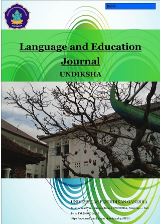THE EFFECTIVNESS OF E-LEARNING FOR ENGLISH CLASS IN EFL SETTING AND ITS IMPLICATION DURING COVID-19 PANDEMIC
DOI:
https://doi.org/10.23887/leju.v4i1.27373Kata Kunci:
effectiveness learning, e-learninginstructions, EFL setting, Covid-19 pandemicAbstrak
The English lecturers in EFL countries were urged to consider online teaching and learning when COVID-19 epidemic has spread around the globe. The purposes of this study were: 1) to describe of how English lecturers perceive the e-learning; 2) to describe kinds of e-learning used by English lecturers; and 3) to describe the effectiveness of e-learning from the English lecturers’ perspective. The data analysis covers interview, data reduction, data display and conclusion. It is found that from the English lecturers’ perspectives, e-learning is the use of internet in accessing the virtual classroom learning to engage the students and lectures into the meaningful learning process. The EFL online e-learning instructions are MALL and CALL. The language acquisition process could not be effectively done as the process of e-learning has its limitations (the lack of internet connection from the students’ side). Despite that problems, e-learning classrooms can be helpful during COVID-19 pandemic.
Referensi
Allo, M. D. G. 2020. Is the online learning good in the midst of Covid-19 Pandemic? The case of EFL learners. JurnalSinestesia, 10(1), 1-10.
Ally, M. 2008. Foundations of Educational Theory for Online Learning. In T. Anderson (Ed.), The Theory and Practice of Online Learning (2nd ed., pp. 15–44). Edmonton: AU Press.
Atmojo, A. E. P., & Nugroho, A. 2020. EFL Classes Must Go Online! Teaching Activities and Challenges during COVID-19 Pandemic in Indonesia. Register Journal, 13(1), 49-76.
Cakrawati, L. M. 2017. Students’ perceptions on the use of online learning platforms in EFL classroom. English Language Teaching and Technology Journal, 1(1), 22-30.
Chamorro, M. L. M. 2018. Comparing online English language learning and face-to-face English language learning at El Bosque University in Colombia. Virginia Commonwealth University.
Clark, R. C., & Mayer, R. E. 2016. E-learning and the science of instruction: Proven guidelines for consumers and designers of multimedia learning. John Wiley & Sons.
Creswell, John W. 2002. Educational research: planning, conducting, and evaluating quantitative and qualitative research - 4th ed. Boston: Pearson Education Inc
Gündüz, N. 2005. Computer assisted language learning. Journal of Language and Linguistic Studies, 1(2).
Kanno, M. 2020. Maintaining and Enhancing Students' Collaborative Learning in a Japanese EFL Higher Education Context. COmmunication is RObust when NAtions Come Together: The Importance.
Krish, P. 2008. Language Learning in the Virtual World: Instructors’ Voices. International Journal of Pedagogies and Learning, 4(4), 113–129. https://doi.org/10.5172/ijpl.4.4.113
Layali, Khaled & Al Shlowiy, Ahmed. 2020. Students' Perceptions of e-Learning for ESL/EFL in Saudi Universities and their Implications during Coronavirus Pandemic: A Review of Literature.
Miles, M. B. & Huberman, A. M. 1984. Qualitative Data Analysis: A Sourcebook of New Methods. California; SAGE publications Inc.
Moorhouse, B. L. 2020. Adaptations to a Face-to-Face Initial Teacher Education Course ‘Forced’ Online due to the COVID-19 Pandemic. Journal of Education for Teaching. https://doi.org/10.1080/02607476.2020.1755205
Murphy, M. P. 2020. COVID-19 and emergency eLearning: Consequences of the securitization of higher education for post-pandemic pedagogy. Contemporary Security Policy, 1-14.
Owusu-Fordjour, C., Koomson, C. K., & Hanson, D. 2020. The impact of Covid-19 on learning-the perspective of the Ghanaian student. European Journal of Education Studies.
Sutrisna, I. P. E., Ratminingsih, N. M., &Artini, L. P. 2018. Mall-Based English Instruction. JPI (Jurnal Pendidikan Indonesia), 7(1), 30-40.










